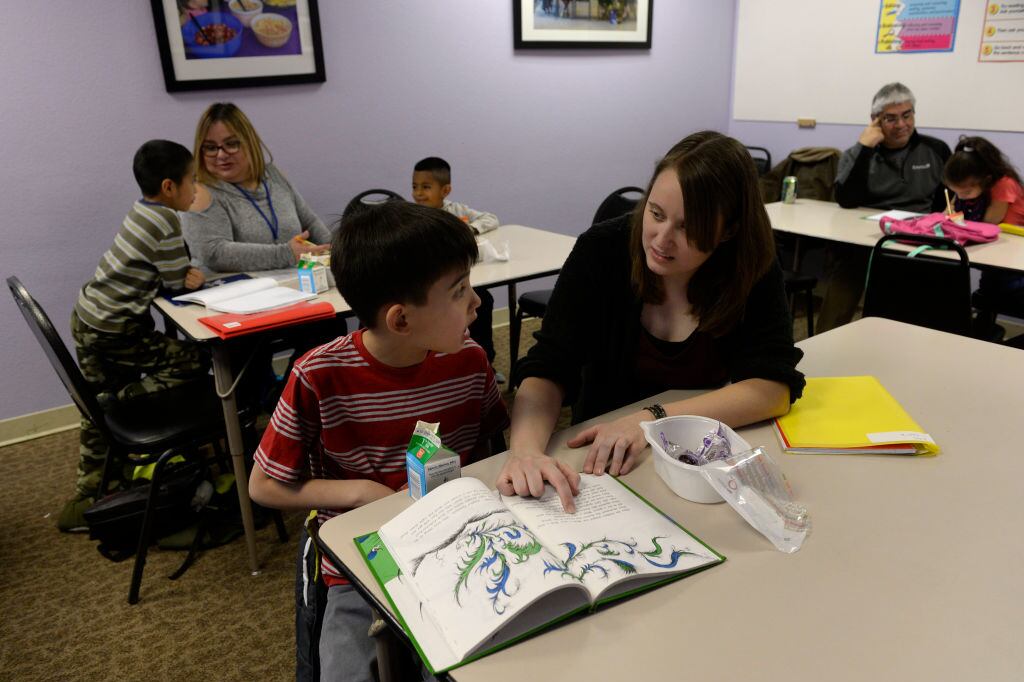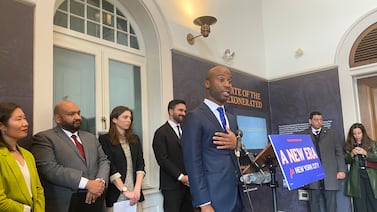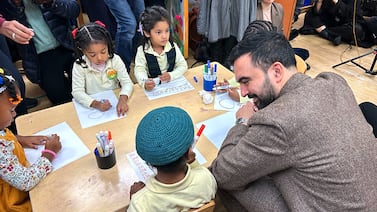When schools closed this spring to stop the spread of the coronavirus, lots of students didn’t get much real instruction in its place. Some struggled to get online. Others didn’t show up to virtual class or were too young for a school on a screen to provide much academic value.
That was true in the U.S., but also in countries around the world. Now, England is launching a national tutoring program designed to help students make up for that learning loss. With the equivalent of about $450 million, the country is set to hire an army of tutors who will help schools meet students’ academic needs.
“Even if we did our very best while schools were closed, there was going to be a need for compensation and additional support,” said Robbie Coleman, head of policy of the London-based Education Endowment Foundation, which is part of a coalition launching the initiative.
The strategy is a sensible one: Research has shown that frequent in-school tutoring is one of the most effective ways to help students make academic progress.
It’s also expensive. But England’s program, and a similar effort in the Netherlands, highlights how other countries are investing in addressing the potential academic fallout of the coronavirus, while the U.S. has made only a modest, patchwork effort — a small federal program here, a few philanthropic grants there — to make tutoring available to low-income students.
There are signs of growing interest among experts, advocates, and at least some policymakers here. A federal bill that would double the size of AmeriCorps has attracted bipartisan support. A report released Monday by the Center for American Progress, a progressive think tank, calls for the federal government to start an “Opportunity Corps” that would recruit recent college graduates to serve as tutors, among other roles.
But the U.S. is also struggling to help schools and families grapple with the pandemic in more fundamental ways. Schools in much of the country aren’t set to reopen on schedule, and talks about additional federal relief legislation — where a program could be included — have stalled out.
“My huge fear is if we don’t do it, we’re going to lose a whole lot of kids,” said former Education Secretary Arne Duncan, who has been advocating for a federally funded tutoring program. Still, he considers it a long shot. “I always hope to be wrong, but I’m not optimistic about anything coming out of D.C. right now.”
England is investing in tutoring, while the U.S. hasn’t mounted a national response to learning loss
The English government has set aside “catch-up” funds for schools, including 350 million pounds — or about $450 million — for a national tutoring program targeted at students from low-income families. That money would fund recent college graduates employed by public schools and also existing tutoring organizations.
The tutoring is expected to be conducted both virtually and in person. It’s appealing to policymakers now because there is plenty of both supply (recent college graduates and others looking for work) and demand (students who lost learning). It’s also appealing because research really does back intensive tutoring as a way to help students make big learning gains, though notably, most studies look at in-person rather than virtual tutoring.
It’s not clear how many students England’s program will actually serve or precisely how the funds will be targeted. The tutoring funding amounts to roughly $50 per student in the country’s state-funded schools.
“It’s a huge investment, and they are light years ahead of where our federal government is,” said Matt Kraft, a Brown University professor who has studied tutoring. But, he said, “It’s not going to buy you anything close to high-dosage tutoring for anywhere near a sizable chunk of the population.”
That’s prompted criticism that the English government hasn’t allocated enough money for its catch-up campaign. By comparison, the U.S. federal government hasn’t provided any money specifically for this purpose. Negotiations in Congress over additional funding for schools fell apart last week, at a time when many states are already cutting education budgets due the pandemic recession and districts are scrambling to figure out what the next school year will look like.
“I think, frankly, most districts and states are overwhelmed with the task of simply figuring out how to open schools safely if at all,” said Kraft.
The most viable plan for large-scale tutoring in the U.S.: Expanding AmeriCorps
A bipartisan group of Senators have backed a plan to substantially increase slots in national service programs, including AmeriCorps. The proposal would double the number of positions to 150,000 this year and further expand it over the next couple of years.
Many AmeriCorps members already work in schools, and bill backers say it would increase students’ access to tutoring and mentoring.
“It’s kind of a win–win,” said AnnMaura Connolly, president of Voices for National Service, a coalition of groups that back expanding service programs. “Communities have mounting needs. And young people need opportunities for purpose-driven work.”
It’s a good idea, Kraft says, though he noted that since AmeriCorps is not exclusively a tutoring program, it’s not clear how many full-time tutors the bill would truly bring into schools.
The Center for American Progress proposal also suggests expanding AmeriCorps, as well as allowing school districts to partner with local nonprofits or directly employ tutors. The analysis estimates that every $2 billion invested could provide tutoring for up to 1.5 million students in high-poverty schools.
There’s no guarantee that the proposal to expand AmeriCorps, which would cost $16 billion over three years, will succeed. Backers were hoping it would be included in the stalled relief package, but Republicans have said they want to limit that legislation’s cost.
Another approach to ramping up tutoring is one championed by Education Secretary Betsy DeVos — provide funding directly to low-income parents, who could then pay for it themselves, as many affluent families already do.
DeVos has encouraged states to provide such microgrants to families, and two states recently won a total of $37 million in federal money to do it. There are no indications that any large-scale direct funding to families is being seriously considered by Congress, though.
Some private philanthropy is flowing to tutoring, but it won’t go that far
Without any guarantee of a federal effort, private philanthropy is stepping in, in limited ways.
SAGA Education, a nonprofit that provides intensive tutoring, has gotten enough philanthropic support to nearly double the number of students it plans to serve this school year, according to Alan Safran, the group’s president.
But that only brings the organization to about 4,500 students served — a tiny fraction of students who might benefit from tutoring, even as it represents a big jump for SAGA. A nearly $5 million grant from the Bill and Melinda Gates Foundation — a large investment for the philanthropy — will only fund tutoring for 2,000 New York City students over two years. (Gates is a funder of Chalkbeat.) It’s a reflection of both the high costs of tutoring and the limits of private philanthropy.
Safran said the organization was hoping to expand to serve up 10,000 students nationally, but didn’t have the funding to do so.
“It takes time and money to deploy an effective program,” said Safran. “We know there’s a lot of kids who need this, but let’s keep plugging and we’ll grow as we can over time.” (The organization is part of AmeriCorps, and so it could benefit if that program were expanded.)
Meanwhile, the Annenberg Institute, a research organization at Brown University, is disseminating best practices for tutoring programs and funding small tutoring pilot programs with philanthropic help.
“Private philanthropic dollars can’t sustain this at all through the long run, but it can help get it off the ground,” said Susanna Loeb, a Brown professor and Annenberg’s director.
Another privately funded plan is the Tennessee Tutoring Corps, which dispatched about 600 college students to Boys & Girls Clubs across the state to help students catch up this summer.
Carter Oakley, a University of Tennessee student, was one of them.
“What am I going to do — just sit here and play video games all summer?” he recalled thinking after his original plan to travel and attend a pre-law program fell apart due to the pandemic.
Although Oakley worked with a fairly large group of students in rural Monroe County, Tennessee, he said he saw them grow academically when he pulled each of them aside for extra help. “Getting in there one one on one … when there’s no distractions, I bet I can teach you how to divide,” he said. “Nine out of 10 times, it worked.”
“If there could be a concerted effort across schools to get kids some level of one on one or one on two,” he said, “I think that could be huge.”






